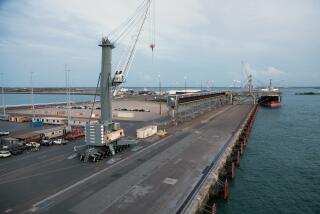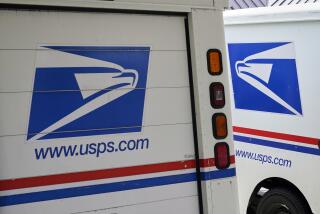Review of Dubai Firm Sketchy in Port Deal, Legislator Says
WASHINGTON — A key Republican said Wednesday that Treasury and Homeland Security officials privately told him the initial review of the firm planning to take over some operations at major U.S. seaports was far less thorough than described by administration officials in later statements.
In an interview with CNN, Rep. Peter T. King of New York, who heads the House Homeland Security Committee, said that there was “no investigation into terrorism whatsoever” in the review done by an administration committee examining the potential national security threats posed by the sale of British-based Peninsular & Oriental Steam Navigation Co. to Dubai Ports World, which is state-owned.
King’s account -- based on discussions he said took place when the government’s approval of the deal became public last month -- seemed to contradict the testimony of administration officials, including Director of National Intelligence John D. Negroponte, who have said repeatedly that the earlier review resolved any national security questions.
Also Wednesday, in a setback for the state of New Jersey, a federal judge ruled against the state’s request for another investigation into the deal, saying the 45-day federal security review the company agreed to on Sunday should be sufficient. U.S. District Judge Jose Linares also refused the state’s request for documents about the deal, saying they were confidential.
Under the $6.8 billion deal, Dubai Ports World would take over major commercial operations at terminals in New York, New Jersey, Pennsylvania, Maryland, Florida and Louisiana. New Jersey and other critics of the deal say it could compromise national security.
New Jersey Atty. Gen. Zulima Farber said that despite the judge’s decision, she was satisfied because she thought the state’s lawsuit prompted the company to agree to the new 45-day review.
Meanwhile, the Washington Post reported in today’s editions that the Bush administration had launched a national security investigation of another Dubai-owned company set to take over plants in Georgia and Connecticut that make precision components used in engines for military aircraft and tanks.
The administration notified congressional committees this week that its Committee on Foreign Investment in the United States was investigating the security implications of Dubai International Capital’s $1.2 billion acquisition of London-based Doncasters Group Ltd., which has subsidiaries in the United States, the Post said. The administration also was investigating an Israeli company’s plans to buy the Maryland software security firm Sourcefire, which does business with Defense Department agencies, the paper said.
Despite DP World’s agreement to a more in-depth review of its port deal, some lawmakers remained skeptical. They have introduced bills in the House and Senate that would give Congress the power to veto the sale if their concerns aren’t satisfied by the additional review.
“If we find out after 10 days that we’re getting stiff-armed, we may have to move in,” King said Wednesday, adding that he preferred that the situation be resolved without legislation.
King scoffed at what he called the administration’s “condescending” attitude toward Congress -- especially since many of the people discussing the sale were themselves unaware of the transaction until it made news.
Democrats seized on the DP World controversy again Wednesday, using it to decry what they called the White House’s neglect of port security.
“This port deal is an example of the cronyism and backroom deals of this administration,” said House Minority Leader Nancy Pelosi (D-San Francisco). “The American people don’t understand why we can’t make our own ports secure. They want answers from the Bush administration.”
But complaints about port security are an issue that crosses party lines, and lawmakers from both parties questioned Homeland Security Secretary Michael Chertoff on Wednesday about the ongoing vulnerabilities at U.S. seaports.
More to Read
Sign up for Essential California
The most important California stories and recommendations in your inbox every morning.
You may occasionally receive promotional content from the Los Angeles Times.










